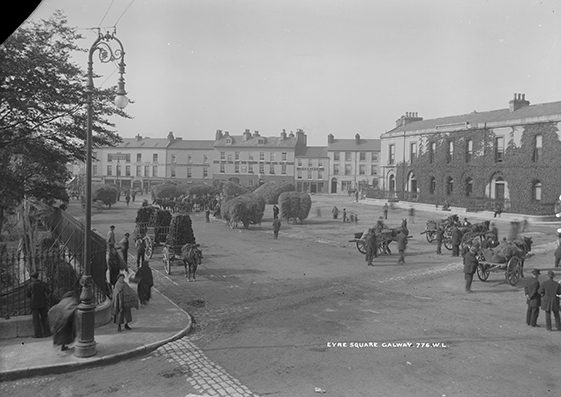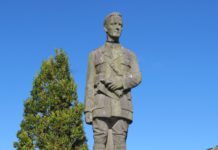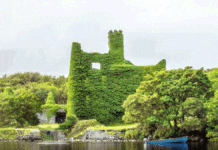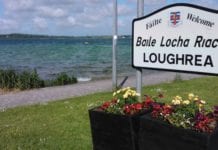The Decade of Centenaries is coming to an end this year, and an exciting programme of cultural events will mark the occasion in Galway City.
The Decade of Centenaries programme was launched in 2012, to highlight the economic and social conditions of the period, the shifts in cultural norms, and the experience of the Irish abroad, as well as the massive events that ended in Irish Independence.
It encompasses the different traditions on the island of Ireland and the initiative provides opportunities to focus on the everyday experience of ordinary people living in extraordinary times, as well as on the leaders and key actors in these events.
It also aims to offer fresh insights and constructive dialogue, and to foster deeper mutual understanding among people from the different traditions.
The City Council has been awarded €50,000 for putting on centenary events in 2023, and has approved a programme for the coming year after an application process in March.
Reflections – A commemoration to the Women of 1923
A series of talks and residencies exploring and reflecting on the role, experiences, expectations of women, and their contribution to events that occurred during a significant period in Irish History.
More detail to follow.
Material Culture of the Irish Revolution & The End of the Civil War – Education Events
These events will focus on the local aspect of the war of independence, the treaty debates, and the civil war, and are suitable for a variety of audiences.
The End of the Civil War & the Executions at Tuam Barracks
Saturday 15 April, 2.30pm to 3.30pm
On 11 April 1923, five anti-treaty IRA Volunteers from Galway – Francis Cunnane (23), Michael Monaghan (22), Martin Moylan (24), John Newell (29) and James O’Malley (25) – were executed at Tuam Barracks, having been found guilty by a Free State Military Court of the unlawful possession of arms and ammunition.
Join historian Cormac Ó Comhraí, author of Sa Bhearna Bhaoil: Gaillimh 1913–1923, as he discusses the executed men, the end of the Irish Civil War and its legacy. It is envisaged that this talk will be podcast and made available on the Museum website.
Suitable for Ages 12+ (booking required)
LIVING-HISTORY WORKSHOP: Material Culture of the Irish Revolution
Tuesday 25 to Friday 28 April, 10.30am to 12pm & 1pm to 2.30pm
Between the Easter Rising of 1916 and the end of the Civil War in 1923 Ireland experienced a political and military struggle that led to the foundation of the Irish Free State.
To mark the centenary of the end of the Civil War, Galway City Museum invites secondary schools to a special living-history workshop.
Accompanied by Museum staff, pupils will visit the Revolution in Galway, 1913–1923 and the War of Friends, 1922–1923 exhibitions to learn about some of the Galway personalities and stories connected to the struggle for independence.
Afterwards Dave Swift of Claíomh will give a living-history demonstration of the material culture of the Irish revolution, giving pupils the opportunity of getting up close and hands-on with items from the period.
Suitable for second-level students (booking required)
DROP-IN SHOW AND TELL: Material Culture of the Irish Revolution
Saturday 29 April, 11am to 1pm
Between the Easter Rising of 1916 and the end of the Civil War in 1923 Ireland experienced a political and military struggle that led to the foundation of the Irish Free State.
To mark the centenary of the end of the Civil War, Dave Swift of Claíomh will give a drop-in living-history demonstration of the material culture of the Irish revolution.
Suitable for All Ages (no booking required)
TALK & DISPLAY: Material Culture of the Irish Revolution
Saturday 29 April, 2pm to 3.30pm
Suitable for Ages 12+ (booking required)
N.B. – where booking is required, contact Galway City Musuem
Phone: 091532460
Email: museum@galwaycity.ie
Website: https://galwaycitymuseum.ie/events/
Digitalisation of Fr Michael Griffin (1892-1920) Collection at Galway City Museum
Fr Michael Griffin is a very significant figure in the history of Galway and in Ireland’s struggle for independence. His killing in Galway in 1920 made headlines nationally and internationally at the time.
Galway City Museum has recently acquired very complete collection of objects associated with Fr Griffin including some of his clerical vestments, his personal effects such as his driving licence and grooming kit, correspondence with family and his library of books, most of which are signed by him.
The collection also includes an interesting series of telegrams dated during his disappearance and the aftermath when his body was discovered as many people offered condolences to the family.
The collection is interesting from a political point of view as it includes his Sinn Fein membership card and a Fáinne showing his dedication to the Irish language and culture. Also includes family memorabilia after his death and commemorations afterwards.
Working with an accredited conservationist, this collection will be conserved, catalogued, and photographed. The result will be published on Galway City Museum’s website.
Clean and seal Liam Mellows Statue
Liam Mellows is a significant figure in the history of Galway City for both the War of Independence and the Civil War.
He is commemorated locally with the renaming of Renmore Barracks, a housing estate, and the erection of a statue in 1957.
The location of this statue is one of prominence, and it is a traditional site used by a range of different groups that relate to the foundation of the Irish state.
Galway City Council will work to renovate the statue through a cleaning process that will remove algae, dirt, etc, from the statue and present this important commemorative statue to the people of Galway City, and the various groups who interact with the statue, at a high standard.












